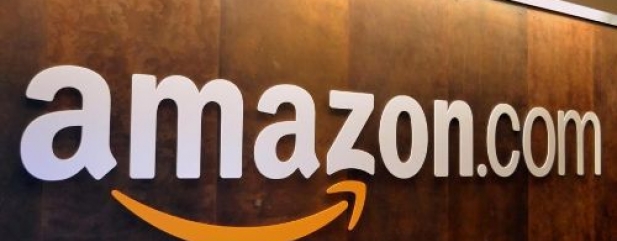Archived article
Please note that tax, investment, pension and ISA rules can change and the information and any views contained in this article may now be inaccurate.
Mighty Amazon washes away competition

Jeff Bezos’ ambitions are seemingly limitless. The billionaire founder of Amazon’s (AMZN:NDQ) Blue Origin business is competing with Elon Musk’s SpaceX for commercial satellite launches and human space transportation services. On terra firma, the tech titan’s tentacles reach out towards ever more industries in a growth land-grab that has numerous businesses looking nervously over their shoulders.
Phenominal growth
Amazon is nothing short of a phenomenon. Over the 10 years that the Scottish Mortgage Investment Trust (SMT) has held Amazon, the US goliath’s shares have risen more than 1500%, reflecting its rise from disruptive online US book retailer to global e-commerce behemoth and dominant cloud service provider. Amazon’s shares continue to ride high on strong cloud computing earnings and rapidly expanding membership for Amazon Prime, perhaps the greatest loyalty programme in history.
High street retailers have lost to Amazon and now it’s taking the online grocery market seriously it could also prove a serious competitor for the big supermarkets engaged in a destructive price war. Not content with delivery drones, a Prime Video service which is a threat to Netflix (NFLX:NDQ), and even a new music streaming service, Amazon is planning to build convenience stores in its latest move to expand into groceries, according to the Wall Street Journal. The Seattle-based e-commerce giant will build drive-in locations for consumers in a rush where online grocery orders will be brought to the car. Only subscribers to Amazon’s Fresh service will have access to these stores, known as ‘Project Como’.
Eating others’ lunches
On a long-term view, there’s huge potential for the e-commerce colossus to grab a greater share of the emerging digital grocery sales market. In the UK, Amazon is stepping up its battle against the supermarkets through Amazon Fresh, offered to Amazon Prime subscribers and with an initial focus on London. The arrival of Amazon Fresh, up and running in the US for about seven years, follows the online giant’s inking of a deal with Morrisons (MRW) in March, which saw hundreds of Morrisons products made available to Amazon Prime Now and Amazon Pantry customers. The Bradford-based grocer is wholesaling shelf-stable, fresh and frozen products to Amazon, despite already operating its own website in partnership with Ocado (OCDO).
Amazon Fresh looks especially alarming for online grocer Ocado. Amazon has had ample opportunity to acquire the online retailer, yet with every week that passes, it is gaining more insight into groceries in the USA and UK. This makes a bid seem less likely and Ocado is now its key pure-play competitor in Greater London.

Who'll get clobbered?
September saw Amazon ramp up its apparel proposition, Amazon Fashion, ‘a one-stop destination for head-to-toe style’ which allows shoppers to try on clothing, shoes and jewellery and send items back via free shipping and free returns on eligible items. The launch, in the words of Shore Capital, ‘is likely to have some of the management teams at current market incumbents twitching and sweating over their respective market share.’
ASOS is one name that may be in the firing line, though Shares sees merit in Shore Capital’s argument that the ASOS proposition ‘continues to be at the innovative-end of the fast-fashion market and this remains a point of difference within its competitive strategy.’
Bezos has long seen a presence in the fashion industry as a way to help Amazon achieve its long-term ambition of surpassing $200 billion in sales. While Amazon’s association with discounting turns off some high-end brands, Bezos has a long-term mindset. Amazon Fashion’s launch could not have come at a worse time for UK apparel retailers, with falling sterling and rising inflation expected to impact sales and margins going forwards. September’s ONS retail sales data showed weak apparel and clothing sales during the second warmest September in over 100 years.
Yes, it is still early days in terms of Amazon’s entry into the clothing market, but it certainly cranks up the pressure on everyone from Bonmarche (BON) and Next (NXT) to Marks & Spencer (MKS), N Brown (BWNG) and Associated British Foods (ABF) owned Primark.
Taking sales away?
Amazon is also looking to eat into the booming market for delivered takeaway food through recent launch Amazon Restaurants, which also so far delivers only in London. The service is free to customers signed up to Amazon Prime. Amazon’s entry into UK online food delivery has negative implications for takeaway food specialist Just Eat (JE.), although Investec Securities believes the overlap with Just Eat’s operations is minimal.
‘Amazon’s online takeaway service is currently only available to c.1.3% of the UK population in certain London postcodes through its Amazon Prime Now service which costs £7.99 a month (or £79 a year),’ explains analyst Alex Paterson, a buyer of Just Eat with a 650p price target. ‘The choice of restaurants ranges from mid-market to Michelin-starred, attracting a more affluent demographic than Just Eat targets, and more closely mirroring the strategy of Deliveroo and UberEats.
Growth philosophy
The minimum order value is £15 on Amazon and the average order value on Deliveroo is c.£27, compared to an average order value of c.£17 on Just Eat, suggesting minimal customer overlap. We think Amazon Restaurants’ expansion across the UK will be limited in the short to medium term as it requires logistics in place for under 1-hour delivery. Amazon Restaurants in Seattle, which launched in September 2015, has just 159 restaurants on its platform (Just Eat has c.4,500 in London).’
Speaking to Wired in 2011, Bezos explained his philosophy: ‘Our first shareholder letter, in 1997, was entitled, ‘It’s all about the long term.’ If everything you do needs to work on a three-year time horizon, then you’re competing against a lot of people. But if you’re willing to invest on a seven-year time horizon, you’re now competing against a fraction of those people, because very few companies are willing to do that. At Amazon we like things to work in five to seven years. We’re willing to plant seeds, let them grow — and we’re very stubborn. We say we’re stubborn on vision and flexible on details.’
Important information:
These articles are provided by Shares magazine which is published by AJ Bell Media, a part of AJ Bell. Shares is not written by AJ Bell.
Shares is provided for your general information and use and is not a personal recommendation to invest. It is not intended to be relied upon by you in making or not making any investment decisions. The investments referred to in these articles will not be suitable for all investors. If in doubt please seek appropriate independent financial advice.
Investors acting on the information in these articles do so at their own risk and AJ Bell Media and its staff do not accept liability for losses suffered by investors as a result of their investment decisions.

 magazine
magazine








